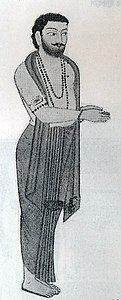Analysis of Come, Let Us Go For A Walk, O Mind
Come, let us go for a walk, O mind,
to Kali, the Wish-fulfilling Tree,
And there beneath It gather the four fruits of life.
Of your two wives, Dispassion and Worldliness,
Bring along Dispassion only, on your way to the Tree,
And ask her son Discrimination about the Truth.
When will you learn to lie, O mind,
in the abode of Blessedness,
With Cleanliness and Defilement on either side of you?
Only when you have found the way
To keep these wives contentedly under a single roof,
Will you behold the matchless form of Mother Shyama.
Ego and Ignorance, your parents,
instantly banish from your sight;
And should Delusion seek to drag you to its hole,
Manfully cling to the pillar of Patience.
Tie to the post of Unconcern the goats of Vice and Virtue,
Killing them with the sword of Knowledge if they rebel.
With the children of Worldliness, your first wife,
plead from a goodly distance
And, if they will not listen,
drown them in Wisdom's sea.
Says Ramprasad: If you do as I say,
You can submit a good account,
O mind, to the King of Death,
And I shall be well pleased with you
and call you my darling.
[Translated from Bengali by Elizabeth U. Harding]
| Scheme | ABCDBX ADEFXX XXXGEX CGXBFXXEH H |
|---|---|
| Poetic Form | |
| Metre | 111110111 11010101 010111001111 111110100 101110111101 010100100101 11111111 00011100 110001110111 10111101 11110100100101 11010111101 100100110 10010111 010101111111 10011010110 11011010111010 1011011101110 10101100111 1101010 0111110 11011 11111111 11010101 1110111 01111111 011110 010101010100110 |
| Closest metre | Iambic pentameter |
| Characters | 1,135 |
| Words | 212 |
| Sentences | 10 |
| Stanzas | 5 |
| Stanza Lengths | 6, 6, 6, 9, 1 |
| Lines Amount | 28 |
| Letters per line (avg) | 32 |
| Words per line (avg) | 8 |
| Letters per stanza (avg) | 181 |
| Words per stanza (avg) | 42 |
Font size:
Submitted on May 13, 2011
Modified on April 27, 2023
- 1:03 min read
- 83 Views
Citation
Use the citation below to add this poem analysis to your bibliography:
Style:MLAChicagoAPA
"Come, Let Us Go For A Walk, O Mind" Poetry.com. STANDS4 LLC, 2024. Web. 29 Apr. 2024. <https://www.poetry.com/poem-analysis/43389/come%2C-let-us-go-for-a-walk%2C-o-mind>.


Discuss this Ramprasad Sen poem analysis with the community:
Report Comment
We're doing our best to make sure our content is useful, accurate and safe.
If by any chance you spot an inappropriate comment while navigating through our website please use this form to let us know, and we'll take care of it shortly.
Attachment
You need to be logged in to favorite.
Log In